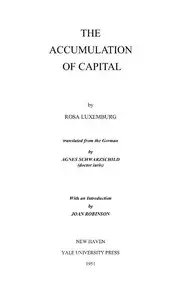"The Accumulation of Capital" by Rosa Luxemburg is a deep study of the economic system of capitalism from the early 1900s. It looks closely at how wealth grows and how the capitalist system keeps itself going, with a critical eye toward Marxist ideas about economics. Luxemburg's main point is to explain how wealth builds up within capitalism, looking at both what this means for society and the problems that it causes. The book starts by talking about Marx's ideas about the economy, especially how society's wealth is reproduced. It explains that capitalist society must constantly reproduce itself to continue but that challenges come up when what the market wants doesn't match what society actually needs. Luxemburg argues that capitalism is different from other economic systems, and its reproduction can come to a standstill even when it seems like everything is in place to keep producing, because it cares more about profits than about what society requires. This beginning sets the stage for Luxemburg to explore how individual choices by capitalists, the way the market works, and how the entire capitalist system functions are all connected.

The Accumulation of Capital
By Rosa Luxemburg
Explore a system driven by profits over people, where markets and social needs clash, threatening the very core of capitalist sustainability.
Genres
Released
2012-11-19
Formats
epub3 (images)
epub (images)
mobi (images)
epub
mobi
txt
Free Download
Summary
About the AuthorRosa Luxemburg was a Polish and naturalised-German revolutionary socialist, orthodox Marxist, and anti-War activist during the First World War. She became a key figure of the revolutionary socialist movements of Poland and Germany during the late 19th and early 20th century, particularly the Spartacist uprising.
Rosa Luxemburg was a Polish and naturalised-German revolutionary socialist, orthodox Marxist, and anti-War activist during the First World War. She became a key figure of the revolutionary socialist movements of Poland and Germany during the late 19th and early 20th century, particularly the Spartacist uprising.
Total Reviews
10.0k
Total reviews from Goodreads may change












